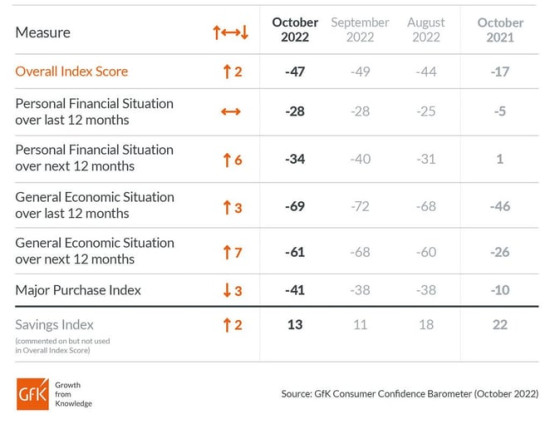Retail sales in the UK fell more than expected last month as soaring food prices prompted consumers to rein in their spending in supermarkets, whilst many stores lost trade on the day of the Queen’s funeral.
Official figures from the Office for National Statistics (ONS) show retail sales volumes slipped 1.4% in September, against City forecasts of a 0.5% drop. This marks the first month that volumes have fallen below pre-pandemic levels in February 2020.
Food store sales volumes fell by 1.8% as cash-strapped consumers made cutbacks. September’s inflation figures released earlier this week showed that food and non-alcoholic beverage prices rose by 14.6% year-on-year – the biggest jump since April 1980, with the price of items such as bread, cereals, meal and dairy all climbing rapidly.
“This is a disappointing but unsurprising latest instalment in the saga of the cost of living crisis,” said Sophie Lund-Yates, equity analyst at Hargreaves Lansdown. “Food sales were especially affected, as customers make do without extra trolley treats or more expensive dining habits.”
Meanwhile, spending on bigger ticket items continued to fall, with household goods retailers (such as furniture stores) seeing sales volumes slide 1.5%. Other non-food stores, such as jewellery retailers, saw a 0.7% decline, while there was a 0.6% drop in department stores.
Clothing stores bucked the trend, with sales volumes rising 1% last month, mainly because of growth in footwear stores.
Online retailer sales fell by 3% in September as people returned to shopping in physical stores. However, volumes are still 18% above pre-pandemic levels.
Looking ahead, Kelly Miely, retail partner at Deloitte, said: “Affordability will be on consumers’ minds as they start to think about festive celebrations this year. This will mean many consumers looking to buy more of their Christmas shopping on promotions compared to last year.
“A more competitive promotional retail environment could intensify in the run up to the festive season as spending continues to weaken. Retailers will be looking to Black Friday as an opportunity to attract a thriftier consumer.”
Lynda Petherick, head of retail at Accenture in the UK & Ireland, added: “With inflation now rising at the fastest rate in 40 years, retailers will need to take action in order to both retain and support consumers in the last months of the year. As rising costs remain front of mind, retailers can’t lose sight of what’s important in helping them weather the storm. Ensuring their workforce is fighting fit for the festive season is key, as well as driving internal efficiencies and removing excess cost to protect margins and avoid passing it to the consumer. If they haven’t done these things already, it may be a difficult few months ahead.”
Separate figures released today show consumer confidence remains “severely depressed” as inflation, political uncertainty, and rising food, energy, and mortgage costs continue to rock the nation.
GfK’s Consumer Confidence Index for October did increase two points to -47. However, it is still close to last month’s historic low with little prospect of any significant improvement in the months ahead.
While three of the five measures that make up the overall index score increased this month, all remain deep in negative territory.

“It’s difficult to think of a time when the economy and individual financial prospects were more volatile,” said Joe Staton, GfK’s Client Strategy Director. “Consumers look out of their windows and see a bewildering clash of politics and economics that is directly impacting their financial security and wellbeing.”
He noted that the three-point fall in the major purchase measure continues a steep downward trend that began in July 2021 and is especially worrying for the final quarter of the year, which many businesses rely on to strengthen their balance sheets.
Staton added: “Households are not just running scared of burgeoning energy and food prices, and the prospect of further base rate rises increasing mortgage costs. They are now facing the likelihood of tax rises and even austerity measures. For ordinary consumers, this web of uncertainty and turmoil amounts to a ‘new abnormal’. The negative environment will deflate future spending plans, and cautious consumers could easily slow the UK economy still further. Consumers, like governments, are just as capable of U-turns, and today’s economic headwinds indicate a long hard winter.”
NAM Implications:
- This web of uncertainty and turmoil amounts to a ‘new abnormal’ says it all…
- i.e. it’s back to basics, folks!
- At all levels…
- Those that can deliver more than it says on the tin, better than the next guy…
- …will be among the survivors.
- Over to you!!




